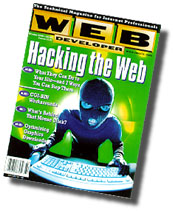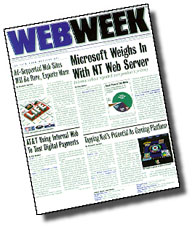Mecklermedia Meets the Internet
Alan was always looking for new products to develop: primarily in newsletters, seminars, and directories. At a dinner in March of 1990, a librarian from the University of Maryland mentioned to him that the Internet would be the next great medium for libraries. “When I heard it it immediately dawned on me that not only was she right, but it was probably the best information delivery medium I had ever heard of. I still have the original notes from that meeting and I started a newsletter in this field. It all started with a newsletter.” Mecklermedia applied its business practices to this newly discovered technology topic, and thanks to Alan’s correct forecast, it has prospered in this now-lucrative technology arena.

What are Alan’s thoughts on his ability to assess a media opportunity? “It is something that you are born with or not.” He feels he is fortunate to possess this acumen. “Over the years I was the first person to recognize the power of audio tapes with books. We created the definitive reference work of the value of books on audio-tape in the 1980’s.” He recognized the potential of CD-ROM before his competitors, and created a newsletter about it in 1983. Mecklermedia created the definitive database on CD-ROM in 1987. “I am not always right you understand. I thought HDTV would be great in 1987 and it wasn’t and it cost us a lot of money. I did work in Virtual Reality which did okay for two years and then went no-where.” Alan feels he was the first to grasp the commercial impact of the Internet. “I don’t think anyone was ahead of me including luminaries such as Gates.”
When the Internet increased in popularity, Mecklermedia concentrated more resources on its products and services for the Internet. “It was very obvious this was going to be successful so there was no dilemma that we would start to focus the business and resources to meet this demand. The power of subscriptions coming in for the magazines, the registrations for the trade shows and the power of the sales of the booth space was incredible. It’s like comparing an atomic bomb to a fire cracker in terms of our other products so there wasn’t a dilemma at all. There was no comparison to what I had done before. I had never seen anything like it before so there was no problem in not working in other areas and concentrating on one specific area.”
To meet the demand for its publications, Mecklermedia modified its corporate outlook, and became completely focused on Internet media resources. “It means that we are totally devoted to reporting information about the internet for those that provide the goods and services and those that use them. We are the middle-ground between those two groups, and to use those information mediums that we think will do the best in getting that information in to those hands.” The company had decided to sell its businesses that were not as lucrative as its Internet activities. “We started to think about shedding some of the other business areas Mecklermedia was involved with while the Internet started to grow rapidly in 1994. We shed CD-ROM in the Fall in 1994 and VR in the Fall of 1995. We decided that in the case of CD-ROM it was strictly a transitional media that had no future other than delivering large files of information. In VR it had involved into a subset of the Internet and not its own stand-alone technology.”
Now that the company is firmly established within the Internet industry, Alan has no intention of straying from the market that has contributed greatly to his personal and business success. “When you have the atomic bomb exploding in your face its a pretty stupid thing to consider spending one iota of effort on anything else than that one thing. I never had anything that was so overwhelmingly popular or had the potential for profitably. When you have an explosion like that you have to be the stupidest man on earth to then try and do three other things and spread out your forces. You have to keep hitting at that one focused thing and never take your eye off the target when you’ve hit the big one.”
Internet World Trade Show – Thank you Lotus
The first Internet trade show took place in the fall of 1993 in New York. The trade show was part of Mecklermedia’s “modus operandi” after the creation of a media resource. “There were very few companies in 1993 that could exhibit, but based on the model of the PC I knew we’d be behind the eight-ball if we didn’t get it started first. We launched, perhaps prematurely, on the exhibit side with nine companies exhibiting but got 1500 attending the seminars. I always looked at things as a trio with a reference directory, some type of periodical and seminars. It was a natural extension of everything we had been doing since 1971.”
The trade show in 1993 was the result of an Internet forum held earlier by Mecklermedia. This event sustained Alan’s energy to forge ahead in uncertain times. “In January of 1992 we ran a seminar in Boston that was really a pre-cursor to Internet World called Electronic Networking and Publishing. Mitch Kapor, the founder of Lotus Development Corporation, was our keynote which was amazing considering who we were and how small the crowd was going to be. That was a pivotal point in my life when things looked the bleakest. I was so inspired by his talk about where the Internet was going, which further reconfirmed my earlier hunches, that I should just stick with it. I was ready to pack it in in January of 1992. It was like going to see Billy Graham or some evangelist and being converted. I was there and I had lost faith and he put me back over the top. It was a very pivotal time in my life that that 30-40 minute talk could effect me that way.”
With the overwhelming public response to the Internet trade show, Mecklermedia capitalized upon this opportunity. “We’re the biggest in the world and pulling away on a daily basis. Internet World is not only pushing the envelope on the US shows but also in 19 countries overseas, and we will be 24 to 26 by the end of October. We have not run a show that has not been successful. The name Internet World is synonymous in the country and world with quality and the nerve center of the industry.” Alan feels the Internet’s breadth of subjects will support specialized trade shows. “All you have to do is look at the PC industry which had Comdex which was the umbrella show. Now there are substantial vertical shows that have stemmed from there such as Interop, PC Expo or Unix Expo. The Internet too will spawn that and we believe we will be competitive in these areas as well. We believe Web Interactive has the same chance of being the next great show after Internet World. Certainly it will become the great summer Internet show in the United States.”

Alan has developed a strong sense of confidence because of his company’s success and its ability to maintain its market share. “Our competitors are now trying to create trade shows that we created three years ago, and we’re trying to create trade shows for two to three years from now. The recent Web Interactive trade show was just held and it is probably something that isn’t needed until next year.” Furthermore, his confidence is buoyed by his previous prognostications and his competitors lack of foresight. “Understand that virtually every major media company particularly in the PC publishing arena turned me down when I was looking for venture capital from 1990 to 1994. I was turned down by over 20 VC firms and media companies including Ziff-Davis, IDG… you name it they turned me down. They thought I was a nut. They didn’t believe in the Internet and thought I was a nut.” A point his competitors are reluctant to admit. “No one wants to recognize that they missed the greatest media company development since the birth of Ziff-Davis in the early 1980’s.”
Going Public
To keep up with demand and to stay ahead of the competition, Mecklermedia’s need for funding grew sharply. An Initial Public Offering (IPO) in February of 1994, allowed the organization to increase its capitalization, and still retain control. “We were desperate for money at the time and a company approached us saying we could net $5 MM if the offering came up. I had been turned down by other investors so I couldn’t see any other way of doing this. Very few people told me it was the wise thing to do, but I checked it out and knowing what I had been through for so many years someone telling me I could have $5 MM in the bank in 90 days…you tell me. It turned out to be a dream story and one that I would highly recommend it you are serious about your product.”

Once the IPO was completed, Alan was comforted because he still held the majority stake in the company he had built. “The public money was just a necessity to grow. No-one wanted to acquire us and we wouldn’t even have gotten $1 MM outright to sell it. We netted $5 MM for selling 35% of the company. I never felt like I gave up ownership of the company after going public. I am still the largest shareholder. The encumbrances of being a public company compared to the worries of being the sole person responsible for not making payroll or being able to expand were more than a grateful trade-off for me.”
Although the company was now publicly held, Alan did not fear it would lose any of its entrepreneurial energy and flexibility. “I think we haven’t lost our entrepreneurial spirit and that we still are an entrepreneurial company that is slowly evolving out of ‘toddler-hood’ from the new Mecklermedia of 1994. We’re still very much an entrepreneurial company which is why we’re taking our competitors to the cleaners because we make decisions and move on them. Our competitors would need 12 to 18 months to conceive a show such as Web Interactive where we thought of it in February, announced it in March, heavily advertised it in April and held it this summer. No other company in the US could launch a technology show that fast. This is why we’re still an entrepreneurial company. The Internet moves so quickly that unless you move on things fast you are going to lose the opportunity. We launched Web Week in Australia in seven weeks and that was because of the entrepreneur Alan Meckler pushing it through.”

